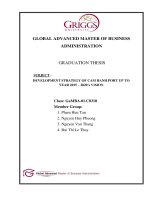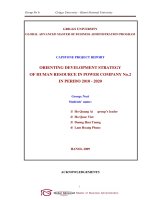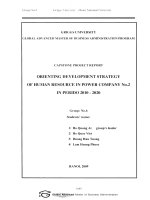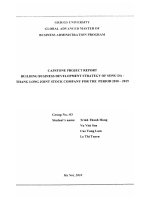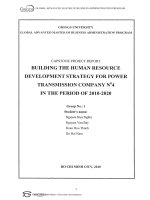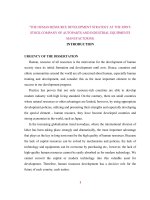Human resource development strategy of ton duc thang university to improve its position on the international rankings
Bạn đang xem bản rút gọn của tài liệu. Xem và tải ngay bản đầy đủ của tài liệu tại đây (138.98 KB, 6 trang )
International Journal of Advanced Education and Research
International Journal of Advanced Education and Research
ISSN: 2455-5746; Impact Factor: RJIF 5.34
Received: 27-05-2020; Accepted: 14-06-2020; Published: 29-06-2020
www.alleducationjournal.com
Volume 5; Issue 3; 2020; Page No. 105-110
Human resource development strategy of Ton Duc Thang University to improve its position on the
international rankings
Nguyen Hoang Tien1, Leo Paul Dana2, Rewel Jiminez Santural Jose3, Nguyen Thanh Vu4, Nguyen Thanh Hung5
1, 3
Saigon International University, Vietnam
2
Montpellier Business School, Vietnam
4
Nguyen Tat Thanh University, Vietnam
6
Binh Duong University, Vietnam
Abstract
Vietnam is a rapidly developing country in many fields, including higher education. Vietnam has more and more universities
in the top 1000 on the international rankings, typically Ton Duc Thang University. Ton Duc Thang University has made a
remarkable advancement compared to other universities in Vietnam. The secret of that promotion lies in the school's human
resource development strategy. This article will present Ton Duc Thang University's human resources development strategy as
a model for other universities in the country and in the region to consult and learn.
Keywords: human resource, development strategy, Ton Duc Thang University, international ranking
1. Introduction
By 2019, a number of Vietnam's universities have reached
the top 1,000 of the prestigious rankings in the world, which
is the joy of a country but at the same time, they are
obstacles when compared to universities. Other regional and
international, the index is still very low. Most rankings place
significant emphasis on research achievement indicators
with little actual evaluation of training quality and social
impact, including Ton Duc Thang University, which is
ranked 901-1,000 among Shanghai Ranking rankings by
Shanghai Jiaotong University. Immediately after Ton Duc
Thang University reached the top 1,000, Mr. Le Van Ut,
Head of Administration Department of Science and
Technology Development, Ton Duc Thang University said:
"Because ranking is required by international criteria. So the
University has to internationalize. The secret of the school is
internationalization in training, teaching staff, scientific
research activities". After being included in the top 1,000,
what do you do to encourage mobilization? Dynamic
internal and external resources continue to improve the
rankings, it is a completely challenging question for the
school and Mr. Le Van Ut said that the important issue
ahead is to stay in the ranks and increase in the following
years. Taking the criteria for evaluation of THE (Times
Higher Education), Vietnamese universities need to
maintain the level of teaching, research, internationalization
and transfer. Ton Duc Thang University is a research
university over the next three decades, in parallel with
taking the role of training, retraining, fostering and
improving professional qualifications, skills, and serving the
needs of applying high-quality human resources to
Vietnam's industrialization and modernization process of
educating high quality human resources for Ho Chi Minh
City and the whole country. In particular, there is an
emphasis on training of workers; conduct applied research
and increasingly effective scientific research to promote
long-term development of the country; pledge to contribute
more and better to a prosperous, stable and sustainable
Vietnam; as well as contribute to the creation of a civilized
and peaceful world [1, 20], (Chuong, 2019; Duong, 2016;
Ngoc, 2019).
Human resources play an important role in the development
strategy of the university in general and for the goal of
internationalization in particular. University management
boards need to devise strategies to develop human resources
of Ton Duc Thang University in order to improve their
position on international university rankings. So the general
objective of this article is to analyze the Ton Duc Thang
University's human resources development strategy to
improve its position on the international university rankings.
Thereby, we could propose solutions to improve and
develop human resources in order to bring higher positions
on the international rankings of the world universities
(Dung, 2003; White, 2019; Tra, 2018) [4, 19]. The article also
identifies the real situation of human resources and human
resource development strategy at Ton Duc Thang University
as well as the factors affecting the human resources
development strategy to the university in order to have a
more general view about the activities that the school is
carrying out and the difficulties that the school is facing in
order to improve and develop its human resources strategy
to improve its position on the international school rankings.
It is possible to offer limitations and appropriate solutions to
develop high-quality human resources, which helps Ton
Duc Thang University develop more comprehensively and
rank high on the international university rankings.
2. Theoretical framework
2.1. Human resource concept and classification
Human resources include all the potential people in an
organization or society (including members of the
management board), which means all members of the
enterprise who use their knowledge, ability and ethical
values for establishing, maintaining and developing
105
International Journal of Advanced Education and Research
businesses. According to Nguyen Hoang Tien (2017),
human resources are the total labor potential of a country or
a locality willing to participate in a certain job. According to
Nguyen Huu Dung (2003) [4], human resources are
considered from two angles of social capacity and social
dynamism. In the first perspective, human resources are the
source of labor for the society, the most important part of
the population, capable of creating material and spiritual
values for society. Examining human resources in terms of
potential helps orient human resource development to
ensure continuous improvement of social capacity of human
resources through education and training and health care.
However, stopping at the potential form is not enough. To
realize that potential, human resources must be transformed
into a dynamic state into human capital, that is, improve the
social dynamism of the people through policies, institutions
and thoroughly unleash the potential of the people. People
with endless potential, if they are free to develop, creative
and devote themselves, and are paid the right value of labor,
that endless potential will be exploited and become a huge
source of social and organizational capital. Human
resources are the people that make up the workforce of an
organization, business sector or economy. Human capital is
sometimes used synonymous with human resources,
although human capital often refers to a narrower effect
(that is, the knowledge that individuals show and economic
growth) (Tien, 2015; Tien, 2017; Tien, 2019; Tien, 2019a).
Depending on different views and research aspects, human
resources are also classified in many different ways. Based
on the origin, human resources are divided into 3 types
(Tien & Anh, 2019; Tien & Grzeszczyk, 2019; Tien et al,
2019) [8]:
• Human resources of working age and with working
capacity. The age restriction depends on the socioeconomic
conditions of each country. In each period, there were
changes and adjustments accordingly. In our country, the
working age limit is from 18 to 55 (for women) and from 18
to 60 (for men).
• The resource involved in economic activity or the socalled economically active population. These are people
who have jobs and are active in the national economy.
• Reserved human resources: this human resource includes
people of working age, but due to various reasons, they have
not participated in economic activities, but when necessary,
they can be mobilized specifically (Tien, 2013; Tien &
Grzeszczyk, 2019) [8]:
+ Those who do housework in the family, this is a
significant human resource and most of them are female
workers.
+ Those who graduate from high schools and professional
but do not have jobs, are very important and quality reserve
human resources if they continue to be trained.
+ Those who have just returned from military service. They
have been trained in health, wills, and revolutionary males.
So, this is a good human resource when the right job
arrangement.
2.2. Human resource development
Human resource development in the broadest sense is the
total of organized learning activities conducted in certain
time periods to create changes in occupational behavior of
workers. Development of human resources is all learning
activities organized by enterprises and provided to
www.alleducationjournal.com
employees by enterprises. Such activities may be provided
for several hours, days or even years, depending on the
learning goals; and to create career change for workers in an
upward direction, that is, to improve their professional
qualifications and qualifications. Thus, in terms of content,
human resource development includes three types of
activities: education, training and development (Tien, 2012;
Tien, 2012a; Tien, 2017; Tien & Grzeszczyk, 2019) [8].
• Education: is understood as learning activities to prepare
people for a career or a new, more appropriate career in the
future.
• Training (also called skills training): is understood as
learning activities to help employees be able to perform
more effectively their functions and duties. It is the learning
process for employees to better understand their work,
which is the learning activities to improve the qualifications
and skills of employees to perform labor tasks more
effectively.
• Development: learning activities that extend beyond the
immediate scope of work of workers, in order to open them
new jobs based on the organization's future directions.
The role of human resource development (Tien et al, 2019a;
Tien & Anh, 2019):
- Improve labor productivity, performance efficiency
- Improve the quality of work performance
- Reduce supervision because trained workers are capable of
self-monitoring
- Improve the stability and dynamism of the organization
- Maintain and improve the quality of human resources
- Facilitate application of technical and managerial advances
to the business
- Create a competitive advantage of the business
- Create a cohesion between the employees and the
company
- Create professionalism of workers
- Create adaptation between employees and current and
future jobs.
- Meet the needs and aspirations of workers development.
- Giving employees a new way of looking and thinking in
their work, is the basis to promote the creativity of workers
at work.
ty
- Contribute positively to the renovation of higher
education, improve the quality of partial training, gradually
improve the quality of the University's general training to
the level of other countries in the region and around the
world by applying apply advanced teaching and learning
technologies, renovate program content and training
methods.
- Gather a team of excellent teachers, prestigious scientists
with high professional qualifications, teaching experience
and enthusiasm to participate in the training of talented
bachelors of science.
- Adopting the project, promoting international cooperation
in training in the form of associating, exchanging cadres and
students and taking advantage of the financial investment of
domestic and foreign organizations.
- The training program is designed to approach the training
programs of a number of prestigious international
universities. In addition to providing deep and extensive
knowledge, students improve their English and Computer
106
International Journal of Advanced Education and Research
skills as well as other soft skills.
- Students of the Bachelor of Science training system are
gifted by excellent professors and scientists of the
University; of universities, research institutes at home and
abroad directly participating in teaching.
- Students of the talented bachelor training program not only
have good professional knowledge but also have good
English proficiency, are equipped with many soft skills and
especially thinking ability, bright ability Creating and
strategic vision. This is an important luggage for children to
develop and become good scientists in the future. Studying
in a favorable environment will have the opportunity to
promote their creative capacity, improve strategic vision and
work and research skills.
3. Research Methodology
This research is based on theoretical and practical research
methods to collect scientific information on the basis of
studying existing documents and using logical thinking to
draw scientific conclusions. The method of collecting
information is based on researching documents related to
the research topic and it is used first when the researcher
wants to approach a topic. The method of theoretical
analysis and synthesis is used to study various documents
and theories related to research topics such as research on
human resources, human resource management and human
resource development strategies. Human resources solutions
are to improve the efficiency of human resource
development and international business management that
are behind the success of Ton Duc Thang University in
terms of how it reached the top of the list of prestigious
universities in the world.
4. Research results and discussion
4.1. Ton Duc Thang University
Ton Duc Thang University is a branded multidisciplinary
university in Vietnam. The school's brand name is due to
strong investment in facilities and through the exchanges
and sharing of traditional non-multi-level speakers and
entrepreneurs. The school belongs to Vietnam General
Confederation of Labor. The school operates under the
autonomy mechanism of tuition fee collection, similar to the
International University of the National University system.
The school currently has a total of five campuses in three
different cities, including ones in Nha Trang, Bao Loc and
Ca Mau, training quality and the value of qualifications are
similar. The precursor of Ton Duc Thang University is Ton
Duc Thang Private Technology University, established
under Decision 787 / TTg-QD of September 24, 1997 of the
Prime Minister. The school is founded, invested and led
directly by the Confederation of Labor through the School
Board, which is chaired by the Chairman of the City Labor
Union. With its increasing growth, in order for the
University to have a legal entity appropriate to its true
nature (which is a School of trade unions and without any
private sector), on January 28, 2003, the Prime Minister
issued Decision No. 18/2003 / TTg-QD to convert the legal
entity of the University into Ton Duc Thang Semi-Public
University, under the People's Committee of Ho Chi Minh
City. On June 22, 2006, with the Decision No. 146, the
Vietnamese Government allowed Ton Duc Thang SemiPublic University to change to a public university on the
basis of autonomy in tuition collection.
www.alleducationjournal.com
With 20 years of operation, Ton Duc Thang University
gradually asserts itself and is the first university in our
country to be rated 3 out of 5 stars by QS Stars. Ton Duc
Thang University (website: tdt.edu.vn) follows the
mechanism of financial autonomy and public university
under the Vietnam General Confederation of Labor. Multidisciplinary training school, including 16 faculties within 8
majors. During nearly 20 years of operation, the school has
been developing strongly in size and quality, becoming one
of the prestigious domestic and international training and
research institutions.
4.2. Ton Duc Thang human resource situation
The total number of students so far is over 24,000 including:
graduate students, college and university students and
students at professional and vocational schools). The
University has accepted more than 3,000 international
students from over 30 countries to attend long-term
undergraduate, graduate, short-term study and cultural
exchanges at the University. From the first student
graduated in March 2002 with 218 bachelors and engineers,
the university has graduated to graduate with 22 masters
(major in business administration); 9,093 bachelor's degree,
university engineers, 448 bachelor's degree in regular
college, 4,429 professional secondary students. According
to the latest statistics, 98.15% of Ton Duc Thang University
students have jobs within 1 year after graduation, many
branches reach 100%, meeting the requirements of
employers. The results of training each year are improved,
the ratio of good and good increases in the school year, the
quality of enrollment and training each year is better.
The organization, staffing, staff, teachers, and employees of
the school have been growing more and more stable and
strong. Since its inception, the school has built and
increasingly complete organization - staffing; ensure
management and carry out training. The centers of the
University carry out research, training and application tasks
of the nature of science, technology and technology services
for society, and have the ability to support and supplement
the school's tasks. effectively. The staff, faculty, and
officials of the school are growing. Recruitment activities
are conducted regularly, meeting twice a year long-term
plans, carried out publicly and transparently. Quality and
quantity are constantly increasing, job proficiency and good
expertise. Up to this point, the professional force has more
than 1300 cadres, lecturers and officials, of which the
professional workforce has doctoral degrees and is
completing more than 50% of doctoral students. Ton Duc
Thang University currently brings together over 200
international lecturers / researchers to work regularly at the
University. They come from all over the world: France,
Belgium, Spain, USA, UK, Korea, Taiwan, Japan, Thailand,
Singapore.
Aiming at the goal of training high-quality human resources
for society, in recent years Ton Duc Thang University has
continuously built and renovated teaching methods, updated
and adjusted the curriculum in accordance with the trend of
international integration, especially the criterion "Practical
training" is one of the factors affirming the strengths and
prestige of Ton Duc Thang University. In order to
effectively carry out that orientation, Ton Duc Thang
University has constantly expanded its network of
cooperation with domestic and foreign businesses to help
107
International Journal of Advanced Education and Research
students have the opportunity to approach and learn the real
working environment. In addition, it grasps the industry
trends and makes commitments to best meet the needs of
human resources of the society. The connection between the
lecture environment and the actual business has opened for
Ton Duc Thang University students many good
opportunities to approach and learn the real working
environment.
Regarding training activities: the school is a multidisciplinary training institution including: Engineering Technology and Applied Sciences (Electrical - Electronics,
Civil & Industrial Construction, Bridge and Road
Construction, Planning) Urban, Information Technology,
Chemical Technology, Biotechnology, Labor Protection,
Environmental Science, Water Supply - Water
Environment); basic sciences (Computer and Mathematics;
Social sciences and humanities); Economics, Administration
(Business Administration, International Business, Hotel and
Restaurant Management, Accounting, Corporate Finance,
Banking); Social & Humanities (Sociology, Vietnam
majored in Tourism, Labor Relations); language branches
(English, Chinese, Chinese); fine arts (industrial fine arts).
From only 8 major undergraduate majors in the first course
(March 1998), up to now, the school has provided training
at 5 levels (from training of technical workers, professional
secondary and secondary education). vocational level,
college to university and graduate).
Training methods of the school are increasingly renovated
and perfected in the direction of practice. All training
programs have a minimum of 25% for exercises, practice,
internships and practice (the amount of time for class not
exceeding 75%, to build and consolidate career skills for
students). From the 2003 school year to now, new teaching
methods have been applied synchronously in schools
(multimedia, e-lessons, simulation). In particular, many
subjects in the specialized period were taught by simulation
software in specialized computer rooms. In some
disciplines, teaching has been conducted in English in most
specialized subjects.
The association of training with foreign universities to
ensure standardization of training quality, to ensure the
ability to convert and recognize academic results for
learners at European and foreign universities is paid
attention. weighted from the start. To date, the majors:
Accounting, Finance, Banking, Business Administration,
Electronics and Telecommunications have been certified by
Saxion University to meet European standards. Students
studying for 3 years at the school, when eligible for English
will be accepted to study at the last year at Saxion
University to receive a diploma issued by this school, if
needed. In addition, the program of bringing trainees
(students in the graduation period) abroad to practice to
improve foreign language skills, vocational skills in the
international environment, behavior and work skills with
foreigners have done very successfully.
Currently, the school is implementing Self-assessment and
Quality Assurance registration with the Ministry of
Education & Training. Regulations on democracy in
schools, inspection and supervision activities are carried out
regularly and strictly. Annual staff and officials conferences
are organized in accordance with regulations; conduct
discussions and decide major issues in school construction;
identify key work areas in the next school year in a
www.alleducationjournal.com
democratic, open and transparent manner.
Scientific research work of lecturers and applicationoriented school students has made steady progress. Every
year, the university provides funding for about 30 to 45
student scientific research projects. Most of the topics went
into applied research and every year, they won the awards
"students of scientific research" and the "VIFOTEC" of the
Ministry of Education & Training and other awards.
4.3. Factors affecting Ton Duc Thang University human
resource strategy.
Socio-economic development
According to the report of Prof. Le Vinh Danh, from 2008
to 2018, in 10 years, Ton Duc Thang University has become
a major national center of education and science and
technology.
Besides
scientific
and
technological
productivity of the school also ranks first in the country.
Ton Duc Thang is the first university in Vietnam that
requires the output of scientific research to be published in
international scientific and technological journals on the ISI
/ Scopus List. have the outputs obtained by the United States
Patents and Trademark Office: USPTO, and applied
research must be sponsored or received by the enterprise.
production since the end of the first plan period. In 2008,
Ton Duc Thang University was a financially autonomous
public school, and by early 2015, the school was allowed
full autonomy. The school's leaders determined that, in
order to have sustainable and comprehensive autonomy, it
must be associated with quality, in order to attract learners
and parents. To do so, the school conducts an internal
evaluation every year, and every two years, the school
conducts an external evaluation. The school always
implements a policy of governance, with very strict
implementation goals, based on the legal corridors,
standardization, supervision of rewards, savings and finally
an income regime. effective.
Education and Training
The curriculum at Ton Duc Thang University is referenced
and applied in accordance with the TOP 100 best
universities in the world. From the curriculum outline,
teaching methods, reference systems and assessment
methods are elaborated and synchronized, increasing
learning efficiency and helping learners keep up with career
requirements in globalization trend. Many modules are
taught in English, students study and practice abroad for 1
semester to 2 years in some majors. Studying in a business
is mandatory with an apprenticeship module conducted in
all specialized and interdisciplinary subjects. The common
philosophy in teaching activities at Ton Duc Thang
University is to maximize the creativity of learners, practice
self-study skills, and think about research, research, not
framed in books and lessons. lecturing. Therefore, the
infrastructure and services serving the needs of self-study
are diversified investments: Academic Clubs in each lobby
linking buildings, English spaces, Informatics spaces,
Libraries inspiration ”with hundreds of thousands of books,
reference materials, and textbooks system reserved for each
subject with a space designed scientifically to enhance
creative inspiration for learners anytime, anywhere. Output
standards are internationalized and advanced in all aspects,
in addition to good professionalism, good ethics, new
graduates, engineers of Ton Duc Thang University who
108
International Journal of Advanced Education and Research
must have an English proficiency of IELTS 5.0 or TOEIC
500; Office IT skills gaining 750 MOS and 50m swimming
certificate. According to the latest statistics, 98.15% of Ton
Duc Thang University students have jobs within 1 year after
graduation, many branches reach 100%. The quality of
teaching and the success of students recognized by QS-Star
(United Kingdom) is 4 stars.
Human resource and students
On June 11, 2008, Ton Duc Thang semi-public university
was officially renamed to Ton Duc Thang University and
transferred to the Vietnam General Confederation of Labor.
In terms of state management, the school's organizational
structure is implemented as a public school with the
governing body being the General Confederation;
financially, the school does not receive financial support
from the state budget and from the Vietnam General
Confederation of Labor. Assets formed to date are
considered the properties of the Vietnam General
Confederation of Labor; not transferred from school but
only for the training of the school. The University is free to
determine its fee collection and fulfill its financial
obligations as a non-public university. Ton Duc Thang
University was established in 1997. From the time of
establishment until transferring to various models (semipublic, public financial autonomy), the university does not
accept recurrent and investment expenses from State budget
or trade union. Recently, the report summarizing the
implementation of the 5-year plan for the period 2008-2013
and 2013-2018 of the school gave impressive figures on
rapid change. For example, from 9 functional departments,
10 faculties, 2 science-technology centers, 1 Vietnamese
magazine in 2008; By 2018, the school had an education
and science-technology system with 61 affiliated units
including: 17 faculties; 5 Research institutes; 18
Departments, Boards and Functional Centers; 1 Scientific
and technological development support fund, 2 English
journals published globally; 12 centers of science and
technology; 5 affiliated units and 01 company. In addition,
there are 63 key scientific and technological research
groups.
Scientific and technology development
This is the first university in Vietnam that requires the
output of scientific research, which must be published in the
International Journal of Science and Technology on the
ISI/Scopus List. Technology studies must have an output
obtained by the U.S. Patent and Trademark Office (USPTO)
Patent and Trademark Office. funding, or take over
production from the end of the first planning period. The
growth rate in the field of science and technology in the past
6 years has always been at exponential level. For many
years, the results of the University's ISI international articles
published next year have doubled compared to the previous
year. According to an expert in the field of science and
technology in Ho Chi Minh City, this is an unprecedented
pace of development in Vietnam. Ton Duc Thang
Univeristy has established the Journal of Information and
Telecommunications, Journal of Advanced Engineering and
Computation with the goal of being listed in ISI and Scopus
Journals for 3 to 5 years, starting from the first issue in June
2017. Over the past 10 years, Ton Duc Thang University
has been a focal point in coordinating with prestigious
www.alleducationjournal.com
foreign universities and scientific organizations to organize
many large and important international conferences. Many
of the workshops started by the school have now become
the annual international seminars of the industry, held each
year in many different countries around the world, such as
ASIA PHARM, AETA, ICFE. In total, the school has
successfully organized more than 30 international
workshops so far. Any seminar held by the school also
brings together dozens of universities from at least 5
countries to attend. In the past 10 years, Ton Duc Thang
University is still the first and only university of the system
of universities in Vietnam to be granted a patent for science
and technology by USPTO. Since 1975 until now, the
country has only 26 US Patents, which are named by the
Vietnamese owner, of which 7 have been granted by Ton
Duc Thang University. The independent university research
group in Vietnam ranked TDTU second in the whole
country (after Hanoi National University), in which science
and technology achievements are always ranked first.
Ton Duc Thang University’s social policy
Ton Duc Thang University operates under the autonomy
mechanism of tuition collection, similar to the nature of the
International Universities in the system of the National
University. Ton Duc Thang University wins the tuition fees,
and is adjusted according to the State's Regulations. Tuition
rates will vary depending on the field of study, the number
of credits. Students who take the entrance exam and gain
admission to Ton Duc Thang University are eligible for
tuition exemptions and tuition assistance according to the
State's regulations. For students who are policy beneficiaries
and poor households: The tuition fee is different from the
University and the tuition fee is exempted from the State
according to Decree No. 74/2013 / ND-CP and Decree No.
49/2016 / ND-CP was issued on May 14, 2010 by the
Government. Depending on the learning and training results
of students and the policy for poor households, the school
will have the varied support level.
5. Improvement solutions
In order to improve the position on the rankings of
international universities, the group set out the following
orientations for human resource development at Ton Duc
Thang University including:
- Improve the quality of teaching staff in the school.
- Strengthening cooperation with international schools and
inviting foreign experts to teach at the school.
- Increase the number of foreign students attending the
school.
- Change and upgrade the school facilities to suit the needs
of students.
- To catch up with the trend and integrate into the world
about the innovations in the education of developed
countries.
- Develop communication, bringing the name of the school
to more people in many countries.
In the coming years and until 2023, the school's position in
the international schools rankings will be raised to at least 3
grades. Continuing to recruit and train professional forces, it
is necessary to select carefully in the process of recruiting
more personnel for the school; build a team of highly
qualified, professional and responsible scientists, willing to
learn and explore new things to catch up with the
109
www.alleducationjournal.com
International Journal of Advanced Education and Research
development of society and meet the needs of students. To
continuously and sustainably develop scientific research,
applied research and educational management activities;
ISO work habits in the fields; perform objective testing to
standardize all outputs. Long-term and continuous
investment in facilities for three decades; to ensure
increasingly adequate, intensive and timely equipment and
equipment for the realization of quality objectives in
education and science and technology in each period;
Constantly proactive technology to work out plans to build
appropriate facilities to meet the needs of the market.
Communication on domestic and international Ton Duc
Thang University; expand the number of foreign students
and experts with appropriate and practical support policies;
Ton Duc Thang University becomes the focal point of
internationalization of the region; improve the
implementation of good communication to many people and
countries. Continue to expand cooperation with TOP 500
universities of the world; create opportunities for learning
about modern management experience, access to advanced
academics and optimal education; Quality assurance up to
international standards. The curriculum and qualifications of
Ton Duc Thang University are accredited and accredited by
international organizations.
9.
10.
11.
12.
13.
14.
15.
16.
17.
6. References
1. Anon. 25. Ton Duc Thang University. [Online].
Available at: />2. Chuong C. Ton Duc Thang University aims to TOP 150
Asia by 2024, 2019. < [Access date:
November 9, 2019].
3. Duong N. Ton Duc Thang University: Focusing on
creating high quality human resources. [Online], 2016.
Available at: -528697.bld
4. Dung NH. Effective use of Vietnamese human
resources. Hanoi: Labor - Social Publishing House,
2003.
5. Ngoc N. "Ton Duc Thang University aims to TOP 150
Asia by 2024, 2019.
6. Tien NH, Phong VMT, Thoi BV, Duc LDM.
Developing High Quality Human Resource to Take
Advantages from CPTPP and IR 4.0. “International
Journal of Research in Finance and Management. 2019;
2(2):67-69.
/>7. Tien NH, Anh DBH. Development of Highly Qualified
Human Resource to Receive Opportunities from CPTPP – Approach of Vietnamese Universities. “International Journal of Advanced Educational Research.
2019;
4(4):85-90.
ISSN:
2455-6157.
/>ue4
8. Tien NH, Grzeszczyk TA. Strategies for Human
Resource Development for Thu Dau Mot University in
Vietnam. “International Journal of Research in Management.
2019;
1(4):1-5.
/>
18.
19.
20.
21.
Tien NH. Staff Motivation Policies of Foreign
Companies in Vietnam. “International Journal of
Research in Human Resource Management. 2019;
1(2):7-10.
/>1-1-13
Tien NH. International Economics, Business and
Management Strategy. Academic Publications, Dehli,
2019a.
Tien NH, Anh DBH, Thuc TD. Global Supply Chain
and Logistics Management. Academic Publications,
Dehli, 2019a.
Tien NH, Anh DBH. Global Strategic Marketing
Management. Ementon, Warsaw, 2017.
Tien NH. Strategic International Human Resource
Management. Ementon, Warsaw, 2017.
Tien NH. Leadership in Socially Responsible
Enterprises. Ementon, Warsaw, 2015.
Tien NH. Competitiveness of Vietnam’s Economy –
Modeling Analysis. PTM Publisher (Wydawnictwo
Menedzerskie), Warsaw, 2013.
Tien NH. Competitiveness of Enterprises in a
Knowledge Based Economy. PTM Publisher
(Wydawnictwo Menedzerskie), Warsaw, 2012.
Tien NH. Change Management in a Modern Economy
– Modeling Approach. PTM Publisher (Wydawnictwo
Menedzerskie), Warsaw, 2012a.
Tra DT. The concept, role, goals and meaning of human
resource
management,
2018.
< />[Access
date:
November 9, 2019].
White DHTD. International human resource
development. [Online], 2019.
Available at: />Website of Ton Duc Thang University "Training
program" />
110
